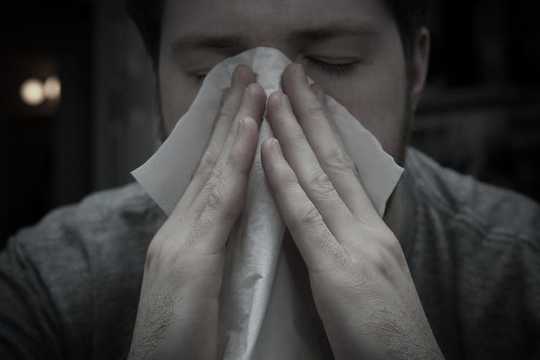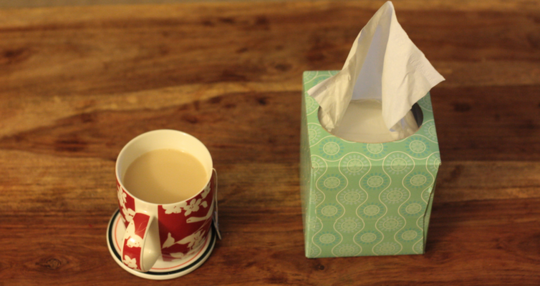
People aren’t productive at work when they’re ill and they risk infecting others. William Brawley/Flickr, CC BY
You wake up on a work day and feel under the weather. If you’re vomiting or have a fever, the decision to stay at home is probably clear cut. But what if you generally feel unwell but are torn about missing work?
We all get minor illness; this is simply a part of the human condition. In winter, the culprit is often the common cold. The average adult gets two or three per year.
The best course of action for the common cold is to rest and stay hydrated. You can use throat lozenges or gargles for sore throats, and the occasional paracetamol for pain. But antibiotics don’t help. And most of the popular treatments for the cold you can buy over-the-counter don’t work either.
Most people recover fully within ten to 12 days, sometimes much more quickly.
One of the essential activities that we can all do to reduce the risk of passing the cold to others is good hand hygiene. So wash your hands after coughing, sneezing or handling tissues.

For a cold, rest and hydration is best. Sean Freese/Flickr, CC BY
Self-imposed isolation – staying at home – is an important measure to avoid spreading the virus. With the common cold, we are most infective during the early symptoms of sneezing, runny nose and a cough.
The number of days to take off work depends on the severity of the illness, and the nature of the work and workplace. It’s important for an intensive care nurse, for instance, to avoid any contact with critically ill patients while they have symptoms. An office worker? Perhaps a few days if you have uncontrolled sneezing and coughing, and feel unwell.
What about gastroenteritis? “Gastro” causes nausea and vomiting, diarrhoea, tummy cramps and pain. People suffering from the typical viral gastroenteritis in Australia recover within five to seven days.
Like the common cold, it’s important to wash your hands. This is crucial around the preparation and handling of food. Viral gastroenteritis is highly contagious and the virus can be spread for at least two days after diarrhoea or vomiting stops.
The amount of time to take off work depends on the individual’s illness and the risk to public health. As GPs, we would insist, for instance, that a chef not return to work until at least two days after their last vomit or loose bowel motion.
We’ve recently had many discussions with worried parents about hand, foot and mouth disease (HFMD). This mild viral infection is particularly common in children in childcare and school. As indicated by its name, it can cause small blisters on the hands, feet, the inside of the mouth and tongue, and also around the nappy area.
HFMD can be spread from the fluid inside the blisters, but also from coughing and sneezing. The virus is in the bowel motions as well.

Children should stay away from childcare or school until blisters are dry. Olesya Feketa/Shutterstock
Again, hand-washing is important to stop the spread. Don’t pop the blisters, and avoid sharing cups, plates and eating utensils.
The blisters are no longer contagious once they dry, and the usual recommendation is for children to stay at home from childcare until they do. Unfortunately for parents, this can take seven to ten days.
What about sick notes?
For the most part, the number of days to take off work for minor illnesses that resolve without treatment is a matter of common sense. As GPs, we’re often bemused by the mutual waste of time that occurs every winter as people see us for no other reason than needing a sick note.
As a society, we need to move away from requiring a sick certificate from the doctor for minor work absences. You don’t need to doctor’s “permission” to be sick so you shouldn’t need it to take sick leave.
People aren’t productive at work when they’re ill and they risk infecting others. The responsibility for this should lie with employers and employees – after all, they know their own workplaces best.
About The Authors
Michael Tam, General Practitioner, and Conjoint Senior Lecturer, UNSW. Dr Alan Huynh, a general practice registrar from the General Practice Unit, Fairfield Hospital, co-authored this article.![]()
This article is republished from The Conversation under a Creative Commons license. Read the original article.
Related Books:
The Body Keeps the Score: Brain Mind and Body in the Healing of Trauma
by Bessel van der Kolk
This book explores the connections between trauma and physical and mental health, offering insights and strategies for healing and recovery.
Click for more info or to order
Breath: The New Science of a Lost Art
by James Nestor
This book explores the science and practice of breathing, offering insights and techniques for improving physical and mental health.
Click for more info or to order
The Plant Paradox: The Hidden Dangers in "Healthy" Foods That Cause Disease and Weight Gain
by Steven R. Gundry
This book explores the links between diet, health, and disease, offering insights and strategies for improving overall health and wellness.
Click for more info or to order
The Immunity Code: The New Paradigm for Real Health and Radical Anti-Aging
by Joel Greene
This book offers a new perspective on health and immunity, drawing on principles of epigenetics and offering insights and strategies for optimizing health and aging.
Click for more info or to order
The Complete Guide to Fasting: Heal Your Body Through Intermittent, Alternate-Day, and Extended Fasting
by Dr. Jason Fung and Jimmy Moore
This book explores the science and practice of fasting offering insights and strategies for improving overall health and wellness.
























